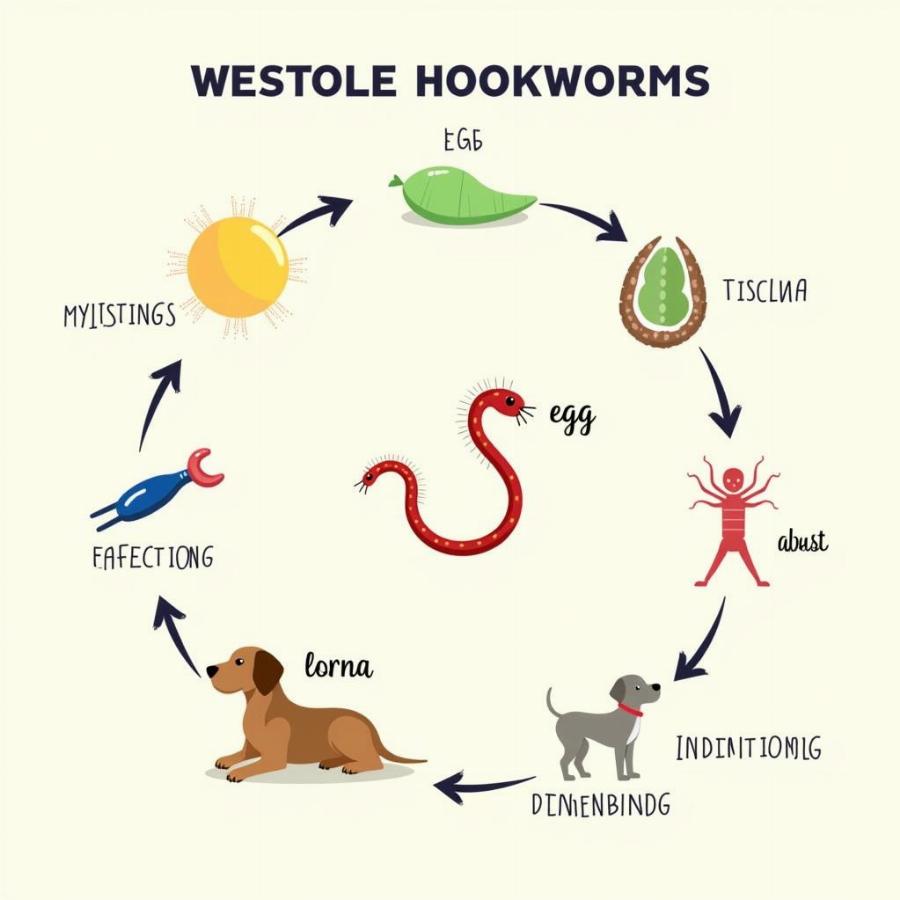Hookworm in dogs is a serious parasitic infection that can cause a range of health issues, particularly in puppies. Understanding the symptoms, treatment options, and prevention methods for hookworms is crucial for any responsible dog owner. This comprehensive guide provides everything you need to know to keep your furry friend safe from these dangerous parasites.
What are Hookworms and How Do Dogs Get Them?
Hookworms are intestinal parasites that attach themselves to the lining of your dog’s small intestine and feed on their blood. These nasty creatures have hook-like mouthparts, hence the name “hookworms”, which they use to latch onto the intestinal wall.
Dogs can become infected with hookworms in a few different ways:
- Ingestion of larvae: Hookworm larvae live in contaminated soil and feces. Dogs can ingest these larvae while sniffing, playing, or grooming themselves.
- Penetration of the skin: Hookworm larvae can also burrow through your dog’s skin, often through their paws.
- Transmission through mother’s milk: Puppies can become infected by drinking the milk of an infected mother dog.
 Hookworm life cycle diagram
Hookworm life cycle diagram
Recognizing the Signs: Symptoms of Hookworm in Dogs
Early detection and treatment of hookworms are vital. Familiarizing yourself with the common symptoms can help you act quickly and potentially save your dog from serious complications. Here’s what to look out for:
- Anemia: Hookworms feed on blood, which can lead to anemia, especially in puppies. Pale gums, weakness, lethargy, and rapid breathing are all signs of anemia.
- Diarrhea: Often accompanied by blood and mucus, diarrhea is a frequent symptom of hookworm infection.
- Weight loss: Despite a normal appetite, dogs with hookworms may experience weight loss due to the parasites stealing nutrients.
- Poor growth: Puppies with hookworms often exhibit stunted growth and development due to malnourishment.
- Skin irritation: If your dog has contracted hookworms through skin penetration, you might notice itching, redness, or hair loss at the point of entry, typically the paws.
Diagnosing and Treating Hookworm Infections
If you suspect your dog might have hookworms, consult your veterinarian immediately. The veterinarian will perform a fecal examination to check for hookworm eggs and determine the best course of treatment.
The most common treatment for hookworms is oral deworming medication. Your veterinarian will prescribe the appropriate medication and dosage based on your dog’s age, weight, and the severity of the infection. It’s crucial to follow your veterinarian’s instructions carefully and complete the entire course of treatment, even if your dog’s symptoms improve.
In severe cases of anemia, your dog may require additional treatments, such as blood transfusions, iron supplements, or supportive care.
Protecting Your Canine Companion: Hookworm Prevention
Preventing hookworm infections is always better than treating them. Here are some proactive steps you can take:
- Regular fecal examinations: Schedule regular fecal examinations for your dog, at least every six months. Puppies and dogs with a higher risk of exposure may require more frequent testing.
- Environmental hygiene: Promptly clean up your dog’s feces in your yard and on walks. This helps break the hookworm life cycle and prevents reinfection.
- Prevent soil contamination: Avoid taking your dog to areas where other dogs frequently defecate, such as dog parks with poor hygiene standards.
- Monthly heartworm preventatives: Many heartworm preventatives also contain medications that protect against hookworms. Talk to your veterinarian about choosing the right preventative for your dog.
Frequently Asked Questions About Hookworms in Dogs
Can humans get hookworms from dogs?
Yes, although rare, humans can contract hookworms through contact with contaminated soil or feces. It’s crucial to practice good hygiene, such as wearing shoes in areas where dogs roam and washing your hands thoroughly after handling your dog or their waste.
Are over-the-counter dewormers effective against hookworms?
While over-the-counter dewormers are available, it’s always best to consult your veterinarian for the appropriate diagnosis and treatment plan. They can recommend the most effective product and dosage for your dog’s specific needs. For more information on over-the-counter dewormers for dogs, you can check out this article: over the counter dewormer for dogs.
How long does it take for hookworms to go away after treatment?
Most dogs will start to show improvement within a few days of starting treatment. However, it’s essential to complete the full course of medication as prescribed by your veterinarian to ensure the infection is completely eradicated.
Can hookworms in dogs be cured?
Yes, with prompt diagnosis and proper treatment, hookworm infections in dogs are highly curable.
How often should I deworm my dog for hookworms?
The frequency of deworming depends on your dog’s lifestyle, age, and risk factors. Consult your veterinarian to determine the best deworming schedule for your furry friend.
Looking for more helpful tips on dog health?
Check out our articles on:
- Dogs with sensitive stomachs
- Tri Heart Plus for dogs
- Simparica Trio for large dogs
- Cholodin for dogs
Beaut Dogs: Your Trusted Source for All Things Canine
Beaut Dogs is your one-stop resource for reliable and insightful information about the wonderful world of dogs. We’re passionate about providing dog owners with the knowledge and tools they need to provide the best possible care for their furry companions. When you need support, don’t hesitate to reach out to us at [email protected] for detailed and accurate answers to your questions. Visit Beaut Dogs today and discover a world of canine care!